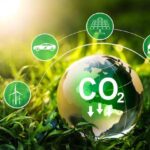Global challenges involve struggles with immediate difficulties and long-term consequences for the planet. Climate change, pandemics, and conflicts are significant issues that pose substantial challenges worldwide. Additionally, the decline in economic growth prospects, poor investment, and serious debt in many developing countries reverse progress made and threaten their sustainable development.
However, amid these tough challenges, this is also the time for action. It is time for ecological transformation. Ecological transformation is not just a call to action but a commitment to protect and restore the environment, improve the quality of our lives, and ensure the planet’s future.
Global Challenges
Global challenges are complex and dangerous problems facing the world today. They affect the development and existence of humans and the Earth’s ecosystems. No single country can solve these challenges, and global cooperation is required to find effective solutions.
Climate change is one of the most prominent challenges, endangering the stability of ecosystems and social welfare. Additionally, pandemics such as COVID-19 pose challenges to global public health and economies.
Moreover, armed conflicts, population crises, and the depletion of natural resources also threaten stability and sustainable development worldwide. Facing these challenges requires cooperation, creativity, and collective effort from all countries and parts of society to find solutions that benefit both humanity and our planet.
Global challenges demand immediate action. This is the crucial moment for us to initiate an ecological transformation. Doing so is about addressing current environmental issues and protecting the future of our planet and people. So, what is ecological transformation?
What is Ecological Transformation?
Ecological transformation is a comprehensive process that changes how we produce, consume, and interact with the natural environment. Ecological transformation aims to create a sustainable living system where humans and nature coexist and thrive in harmony.
-
1/ Combating Climate change:
-
-
- Reduce Greenhouse Gas Emissions: By reducing carbon dioxide (CO2) and other greenhouse gas emissions, we can minimize the impact of climate change.
- Protect the Environment: Protecting and restoring natural biomes such as forests, oceans, and land can absorb CO2 from the atmosphere, helping to mitigate the greenhouse effect.
- Adapt to Climate Change: Develop measures to prevent and cope with climate change’s effects, such as strengthening flood control infrastructure and constructing storm-resistant housing.
-
-
2/ Optimize resource use:
-
-
- Efficient Resource Utilization: Leverage advanced technologies such as energy and water to optimize resource use.
- Conservation: Promote resource conservation by using energy-efficient appliances and reducing waste.
- Reuse and Recycle: Encourage the reuse and recycling of resources to minimize waste and conserve rare resources.
-
-
3/ Manage all forms of pollution:
-
- Address Environmental Pollution: Develop and apply technologies to treat environmental pollution, such as water purification and waste management, to reduce pollution’s impact.
- Protect Human Health and Ecosystems: Implement measures to protect human health and ecosystems from the negative impacts of pollution.
4/ Improve quality of life:
- Enhance Human Living Standards: Develop educational, healthcare, and infrastructure programs to improve people’s quality of life.
- Pursue Sustainable Development: Ensure that economic and social development does not harm the environment and society, creating sustainable benefits for future generations.
To address the challenges of climate change, we need to reduce greenhouse gas emissions and adopt adaptation measures. Optimizing resource use is crucial to more efficient, frugal, and reusable resource utilization. At the same time, managing all forms of pollution is essential to protect human health and ecosystems. Lastly, improving quality of life is the ultimate goal, ensuring everyone has access to a healthy and sustainable living environment.
This is not just the responsibility of an individual or a nation but a shared responsibility of the entire international community. We must act together, with solidarity and determination, to face and overcome these immense challenges. We can ensure a sustainable and safe future for everyone through cooperation and collective effort.






